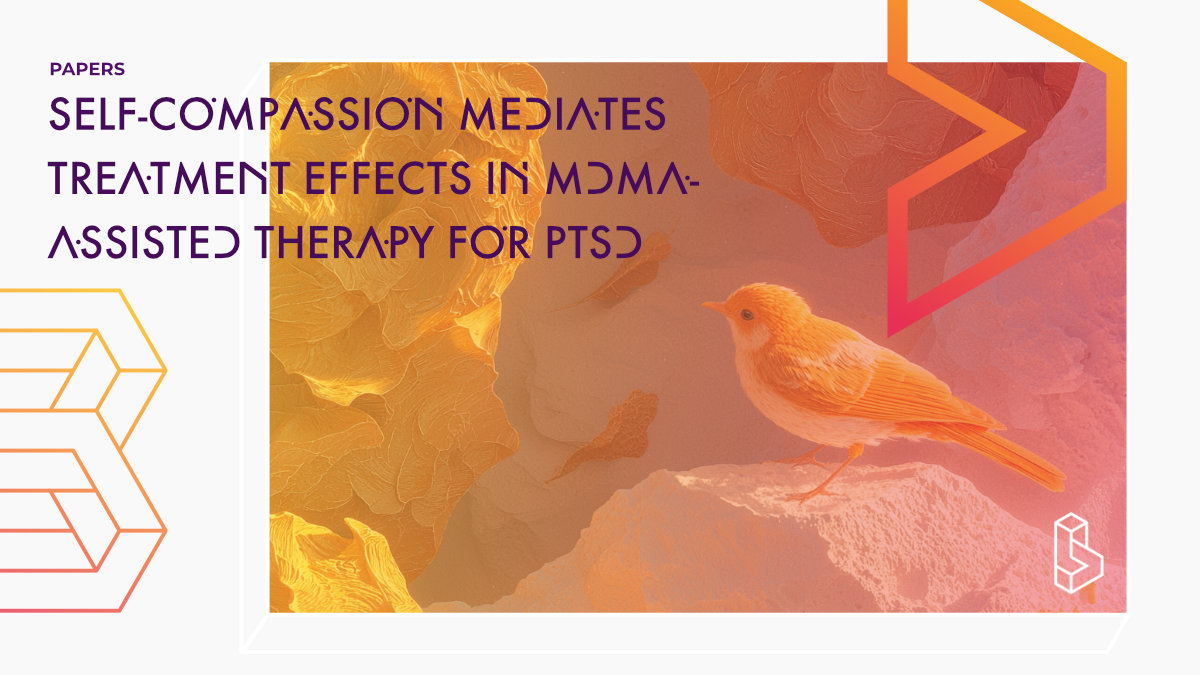This secondary analysis (n=82) of a Phase III RCT of MDMA-assisted therapy found significant improvements in both uncompassionate self-responding and compassionate self-responding across all six Self-Compassion Scale subscales, most with large effect sizes. Changes in self-compassion fully mediated the reductions in PTSD severity and depressive symptoms observed with MDMA-AT versus placebo plus therapy, though no significant effects were seen for alcohol or substance use outcomes.
Abstract of Self-compassion mediates treatment effects in MDMA-assisted therapy for PTSD
“Background: Posttraumatic stress disorder (PTSD) is a severe condition often complicated by co-occurring disorders, such as major depression, alcohol use disorder, and substance use disorders. A well-powered phase 3 randomized, placebo-controlled trial has shown that MDMA-assisted therapy (MDMA-AT) may be an effective treatment for severe PTSD. However, the psychological mechanisms driving the therapeutic effects of MDMA-AT remain unclear. One potential mechanism is self-compassion, which is commonly conceptualized as a balance between compassionate self-responding (CS) – encompassing self-kindness, common humanity, and mindfulness – and uncompassionate self-responding (UCS) – encompassing self-judgment, isolation, and over-identification.
Objective: This secondary analysis aimed to explore whether MDMA-AT enhances aspects of self-compassion and if changes in self-compassion mediate the therapy’s effectiveness in reducing PTSD severity, depressive, and alcohol and substance use symptoms.
Method: Eighty-two adults diagnosed with severe PTSD participated in a double-blind trial comparing three sessions of either MDMA-AT or placebo combined with therapy. Measures of PTSD severity, depressive symptoms, alcohol and substance use, and self-compassion were collected at baseline and 18 weeks later.
Results: MDMA-AT led to statistically significant improvements in both UCS and CS. Significant improvements were also observed across all six subscales of the Self-Compassion Scale, including self-kindness, self-judgment, common humanity, isolation, mindfulness, and over-identification, most with large effect sizes. Changes in UCS and CS significantly and fully mediated the effects of MDMA-AT compared to placebo plus therapy in reducing PTSD severity and depressive symptoms. Findings were not significant for alcohol and substance use outcomes.
Conclusions: These findings suggest that self-compassion may play a critical role in the therapeutic effects of MDMA-AT. Further research is needed to investigate the role of self-compassion in MDMA-AT to refine and develop more targeted, effective interventions for individuals with PTSD and co-occurring depression.”
Authors: Gabrielle Agin-Liebes, Richard J. Zeifman & Jennifer M. Mitchell
Summary of Self-compassion mediates treatment effects in MDMA-assisted therapy for PTSD
Agin‑Liebes and colleagues open by noting that post‑traumatic stress disorder (PTSD) is common, debilitating and frequently accompanied by depression and problematic alcohol or other substance use. Licensed medications and trauma‑focused psychotherapies help many people, yet high drop‑out rates and modest effect sizes leave a large treatment gap. Phase III data now show that MDMA‑assisted therapy (MDMA‑AT) can produce large, durable symptom reductions with better retention than conventional approaches.
The authors argue that understanding how MDMA‑AT works is essential for refining the intervention. They focus on self‑compassion—the capacity to respond to one’s own suffering with kindness, a sense of shared humanity and mindful awareness. Contemporary theory separates compassionate self‑responding (CS) from uncompassionate self‑responding (UCS); both are measured by the 26‑item Self‑Compassion Scale (SCS). Earlier research links low self‑compassion to PTSD maintenance and shows that raising self‑compassion can ease distress. Preliminary findings suggest MDMA‑AT increases overall SCS scores, but the specific CS and UCS dimensions and their causal role have not been examined. The current secondary analysis addresses that gap.
Methods
Participants
Find this paper
https://doi.org/10.1080/20008066.2025.2485513
Open Access | Google Scholar | Backup | 🕊
Cite this paper (APA)
Agin-Liebes, G., Zeifman, R. J., & Mitchell, J. M. (2025). Self-compassion mediates treatment effects in MDMA-assisted therapy for posttraumatic stress disorder. European Journal of Psychotraumatology, 16(1), 2485513.
Compound Details
The psychedelics given at which dose and how many times
MDMA 80 - 120mg | 3x
Linked Research Papers
Notable research papers that build on or are influenced by this paper
MDMA-assisted therapy for severe PTSD: a randomized, double-blind, placebo-controlled phase 3 studyThis double-blind, placebo-controlled study (n=90) finds that MDMA-assisted therapy (3x 80-120mg) is effective (d=.91, large effect size) in the treatment of PTSD. 67% of those in the MDMA-group no longer qualified for PTSD (vs 32% for the therapy-only group). This study is part of the Phase III trial to get MDMA approved by the FDA.
Linked Clinical Trial
A Multi-Site Phase 3 Study of MDMA-Assisted Psychotherapy for PTSD (MAPP1)Posttraumatic stress disorder (PTSD) is a debilitating psychiatric disorder that can develop after a traumatic life experience that severely reduces the quality of life. This multi-site, double-blind, placebo-controlled, randomized Phase 3 study assessed the efficacy and safety of MDMA-assisted psychotherapy compared to psychotherapy with placebo in participants diagnosed with at least moderate PTSD.

